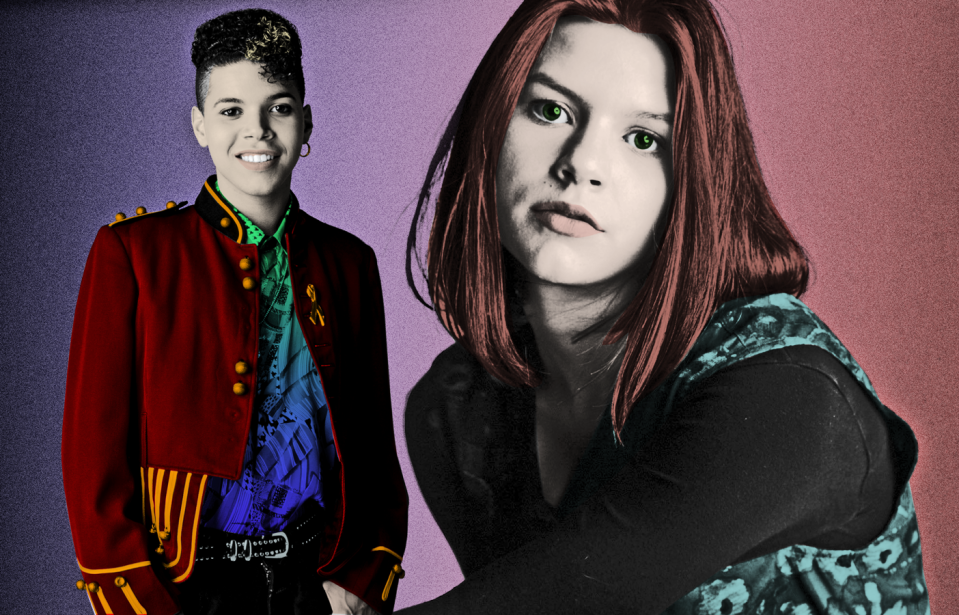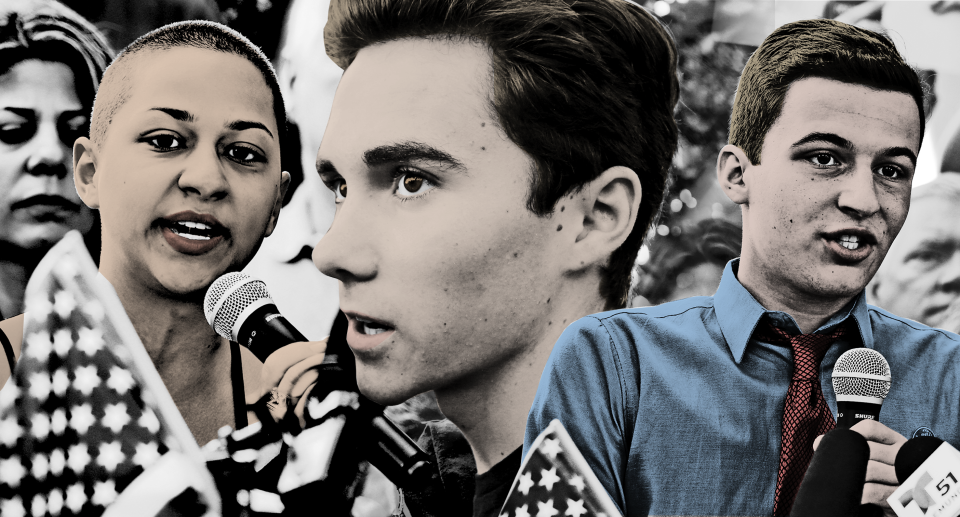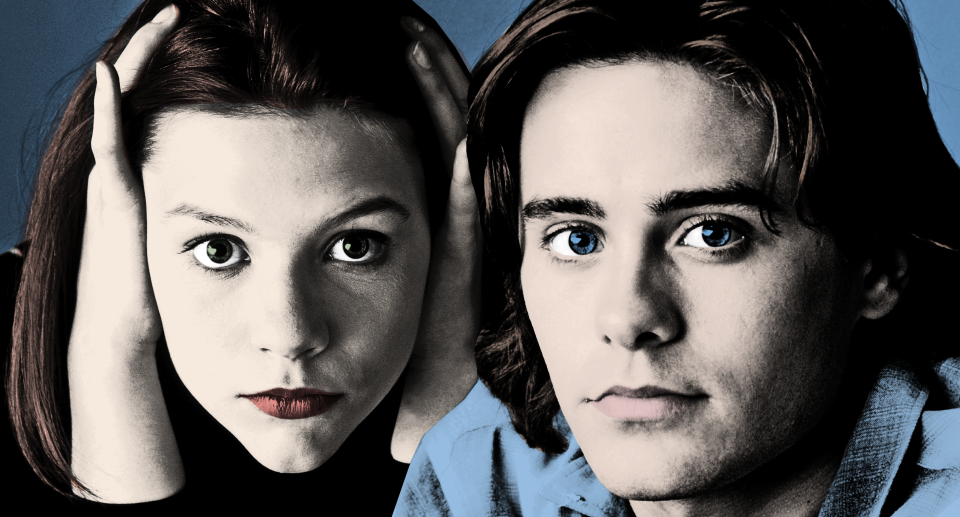The moment TV's teen revolution truly began

Back in the late ’70s, a full decade before Marshall Herskovitz and his producing partner, Ed Zwick, would change TV by creating thirtysomething, they cut their teeth as writers on the aptly titled ABC drama Family. Created by Jay Presson Allen and executive-produced by Leonard Goldberg, Aaron Spelling, and Mike Nichols, it revolved around the Lawrences, a family from Pasadena, Calif., whose youngest child was Buddy — the character that would launch Kristy McNichol’s career and, inadvertently, help inspire the most influential teen TV series of all time.
When Herskovitz and Zwick tapped Winnie Holzman to create My So-Called Life — an authentic early-’90s drama centered on a teenage girl, Angela Chase (Claire Danes) — they wanted to upend the rules they formerly had to abide by.
“We used to get notes [on Family scripts] from Len Goldberg, and there would be a line and it said on it ‘NOB.’ I remember asking, ‘What does NOB stand for?’ and it meant, ‘Not Our Buddy,'” Herskovitz tells Yahoo Entertainment. “They wanted her to be nice all the time, and they wanted her to be a good girl. I think there was this way in which teens, but especially teenage girls, were still seen as voiceless in the culture. And I think that was the thing that most motivated us, when we were doing My So-Called Life, was to say, ‘These are people within our lives who need to be heard.'”
If Herskovitz’s memory is correct, one “NOB” scene had Buddy, who he notes was younger than 15-year-old Angela when the series began, talking back to her mother “too stridently.”
“Which is so funny to me,” he says, “because in My So-Called Life, Angela would scream at her mother. Basically, she wanted to kill her mother. So, certainly, there was a change.”
As part of our “Why Teen TV Matters” series, we spoke with Herskovitz, who’s now co-showrunner of CMT’s Nashville with Zwick, about the other shifts he’s witnessed in his over 40-plus years in his TV career.
The beginning

Most people agree that the teen TV genre didn’t even exist until My So-Called Life. “It’s funny: I used to talk about this with Ed Zwick all the time — that I would get very disturbed watching television as a child, because it in no way resembled what my life looked and felt like, and I couldn’t figure out who was crazy,” Herskovitz says, recalling that he found My Three Sons with Fred MacMurray particularly unnerving. “It’s in the nature of sitcoms to basically portray people as clinically insane: like one week they are completely obsessed with something, they start a business, and they get the whole neighborhood involved, and it causes some horrible thing to happen, and the next week that’s completely forgotten and they’re doing something else. Because My Three Sons was mostly about these teenage boys, I found it to be utterly perplexing and disturbing.”
When he, Zwick, and Holzman, who had been a writer on thirtysomething, were brainstorming ideas for a new series, it was Herskovitz who initially suggested doing a drama focused on teens. “I had written a pilot for Showtime in the mid-’80s — when Showtime was just beginning, as a matter of fact — about a 17-year-old boy, and I found myself exploring issues that I had never seen on television before,” he says. “Most shows about teens on television [in the early ’90s, like Beverly Hills, 90210] were very exploitative about sexuality and meant to be titillating rather than inside the experience of what it meant to be an adolescent. What I said to Winnie was, ‘This is something that still interests me. What about you?’ And she said, ‘My God, this is something I think about every day.'”
ABC initially passed on the pilot and then never quite knew what to do with the show, right down to its loud MTV-esque promos. “They completely ignored the fact that the show was so introspective. And we kept telling them: ‘This is a show for grownups. Every grownup was once a teenager. You’re not getting what we have here,” he says. “And they just never believed in the show. In fact, it took two and a half years to do the 19 episodes that we produced. I remember Ed had made an appeal to [then-network president] Bob Iger when they were talking about canceling the show, saying, ‘You should keep this show on the air because teenage girls have no voice in our culture, and the show is giving them a voice.’ And the irony of that is so incredible now, 25 years later, because teenage girls have such a huge voice in the culture. I mean, look at the Parkland kid [Emma Gonzalez].”

Like every showrunner who’s participated in our “Why Teen TV Matters” series, he’s been inspired by the Marjory Stoneman Douglas High School students. “I’m not the only person to think these kids are incredible. One of the things that strikes me is that, quite naturally, this group is so heterogeneous — there are boys and girls, and people of different ethnic backgrounds — and I find that so refreshing and lovely to see that it naturally happens that way. And also, how together they are, how much solidarity they have, how generous they are with each other. It’s an extraordinary moment, it really is,” Herskovitz says. “They have this extraordinary moral high ground. I mean, no one should have to be in fear for their life when they go to school. And it’s reaching the point now where every kid in this country is afraid for his or her life. You cannot not listen to these people.”
In 1994, My So-Called Life had an episode, “Guns and Gossip,” that deals with a gun accidentally going off in school — a cautionary tale that Herskovitz still sees as current. Gay student Rickie (Wilson Cruz) is being bullied so badly that he’s OK with people believing he’s the one who brought in the weapon because it might make them think he’s dangerous and scare them off. “It was really a multifaceted story about the pressures kids go through in high school, using this gun as the instigating incident, but really it was never about the gun,” he says. “What touched me most about that episode was the storyline about Brian Krakow, played by Devin Gummersall, who the principal decided he was going to browbeat into getting him to rat on whoever it was brought the gun. So it became a different kind of bullying, where the principal was bullying this kid and tried to intimidate him and scare him, and, finally, at the end, Brian stands up to the principal, and says, ‘You’re harassing me, and if you keep doing it I’m going to sue you.’ It was just a wonderful moment that I just love, where the kid found his voice and stood up to the grownup.”
Herskovitz’s favorite episode of the series is “The Zit,” a particularly poetic one written by Holzman based on Kafka’s Metamorphosis. “It’s about Angela having a zit that’s tormenting her the whole time — that somehow her entire life will be ruined by the fact that she has this huge zit on her chin — and, meanwhile, they’re learning about how, in the Kafka story, this guy wakes up as a cockroach,” he says. “It’s about how each kid’s image of themselves is so negative and tortured, and, also, untrue — and how they are being so done in by what they feel they have to be in order to fit into society. It’s such a remarkable piece of work.”
Jason Katims, the future showrunner of Friday Night Lights, Parenthood, and Rise, who got his start in the My So-Called Life writers’ room, has cited the episode as an example of their goal: “to tell as little story as possible.”
“Honestly, we did not write that show in any way differently for teens. In other words, we wrote that show the same way we wrote thirtysomething,” Herskovitz says. “It was about teens, and so we were inside the experience of what it means to be a teenager, which means things are felt more intensely. There’s less context in which to help to get yourself off the ledge when you think something is horrible. But, really, it was the same approach, which is to say, ‘How can we honestly depict how people experience themselves in the world?’ And that’s a hard thing to do. It takes a lot of thought, and a lot of self-exploration, a lot of honesty, and I felt that that’s what Winnie was so brilliant at.”
Back to the future
Marshall and Zwick also created the family drama Once and Again, which ran on ABC from 1999 to 2002. Browse clips on YouTube, and you’ll be reminded of a storyline in which teen Grace (Julia Whelan) grew very close to a teacher, played by Eric Stoltz. When we talked with The Vampire Diaries‘ Julie Plec, who worked on Dawson’s Creek for a time, she said someone might have to think twice today about doing a storyline like Pacey sleeping with his teacher. Herskovitz agrees. “But remember, in Once and Again, it never was fully realized. You understood that he had a crush on her and she had a crush on him, but it wasn’t about, ‘Oh, they’re going to have an affair.’ It was more about the idea that two people who are inappropriate to each other would still have feelings for each other, and I might still be interested in exploring that today,” he says. “I mean, I find the idea of exploring what can’t be, but what you still want, is a part of human nature.”
Human nature is also why he’d concur with Holzman, who told us, looking back on My So-Called Life through the prism of the #MeToo movement, that she has “no regrets” about the use of the bad-boy trope — Angela’s crush on Jared Leto’s Jordan Catalano, who didn’t always treat her well. If characters are “neatly shorn of their problems, they’re not really gonna feel like people that you’re actually encountering,” Holzman said — and mistakes are how people learn.
“If there’s one thing we’ve learned, it’s that it’s not necessarily the moment in the culture for men to say a lot about the #MeToo movement, so I think I should not say a lot,” Herskovitz begins, “but I will say that there have been many moments in my life where I felt the culture tried to simplify human nature or simplify the way humans should be in this world, and that has never interested me. … Men are complicated, women are complicated, there are bad people in this world, there are confused people in this world, and I’m only interested in exploring the entire universe that exists inside a human being — and part of that universe is dark, and part of it is light. I wouldn’t have any problem talking about a girl’s attraction to a bad boy today because that exists in human nature. I’m not saying it’s good or bad — I’m just saying it exists — and I would want to portray it as part of a developmental process, because I think it is.”

So many of the producers who’ve participated in this “Why Teen TV Matters” series told us that My So-Called Life was the show that first taught them the impact a series could have. That’s the reason the series may be the one Herskovitz feels proudest about having worked on in his career. “Twenty-five years later, to hear with some regularity how it influenced people, or how they felt in some way empowered by it, or just understood is a remarkable feeling, frankly. And I give Winnie all the credit. I mean, she made that happen, and I am just so happy to be able to help her bring that vision to the world,” he says.
In retrospect, he can even appreciate that My So-Called Life is “like the James Dean of television shows” — that in some way, it’s better that it was cut short at only 19 episodes. “Because it lives in this perfect memory of each one was a gem,” he says. “I’d like to believe that if we had done five seasons of it, it could have been still great, but there is something about it having died young that just adds to that feeling of specialness about it.”
He is, of course, also proud of the equally groundbreaking thirtysomething, which ran from 1987 to 1991, and, in his words, “went right up to that envelope of how little story could you have and still fill an hour of television — because the less story you had, the more human interactions and moments of life you could depict.” But he points to a movie he directed, 1998’s Dangerous Beauty, based on the true story of 16th century Venetian courtesan/poet Veronica Franco, as well.
“The idea behind this film was to explore the idea of women owning their own sexuality and not being stopped by the chain and punishments that society so often forced on them,” he says. Though it wasn’t a blockbuster, it became a kind of cult hit on Netflix with women who considered it an anthem. “I was very proud of that, and I was actually very conscious while I was making it that in some way I was making it for my daughters, even though they were too young for it at the time,” he says. “The idea of them becoming women and navigating their own lives, I wanted to create a message of something that showed the possibility of liberation.”
Empowering young women is something he still strives to do on Nashville, with Lennon and Maisy Stella’s characters, Maddie and Daphne. Bringing us full circle, he says: “There’s just an assumption on this show that these kids are going to speak their minds. There’s no pretense that they are going to be ‘ladylike,’ in some old-fashioned sense of what girls are supposed to be. They argue with their father, they argue with each other, they just live their lives, and I love that. I love that they are fully realized in that way.”
My So-Called Life is currently streaming on Hulu. Watch all 19 episodes for free on Yahoo View. Nashville returns for the start of its final episodes on June 7 on CMT.
Read more “Why Teen TV Matters” from Yahoo Entertainment:

